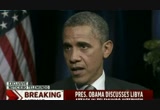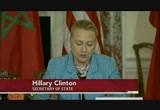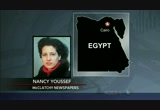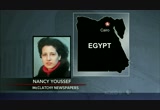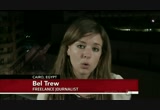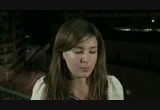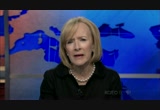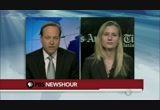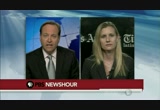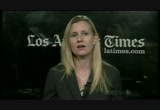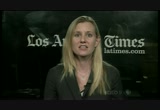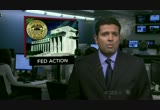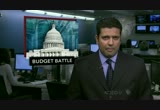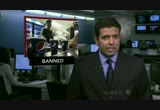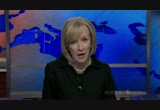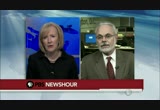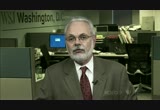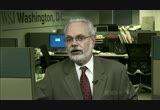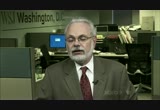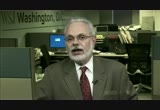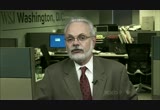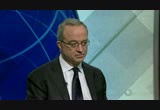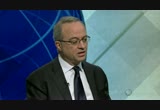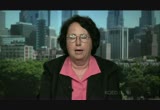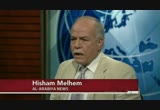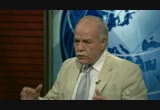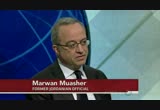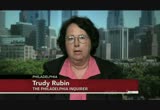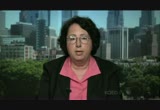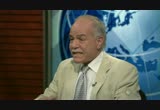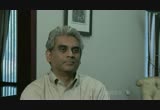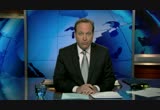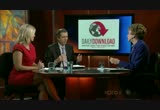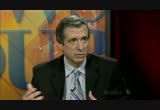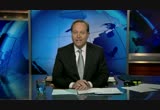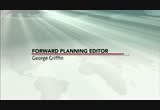tv PBS News Hour PBS September 13, 2012 3:00pm-4:00pm PDT
3:00 pm
>> woodruff: and i'm judy woodruff. captioning sponsored by macneil/lehrer productions >> brown: demonstrators protested outside u.s. embassies around the arab world today, two days after the american consulate in libya was attacked. good evening. i'm jeffrey brown. >> woodruff: and i'm judy woodruff. on the newshour tonight, we have new details about the killing of the u.s. ambassador in bengazi and the film that fueled the anger there and elsewhere. >> brown: plus, we get perspective on the middle east nearly two years after the arab spring uprisings. is it now a more dangerous place? >> woodruff: then, as the federal reserve unleashes a new program to encourage job creation, we assess the potential impact on consumers and the u.s. economy. >> brown: fred de sam lazaro reports on a helping hand for low-income american entrepreneurs, inspired by loans offered in the developing world.
3:01 pm
>> i used it to purchase about 30 handmade senegalese drums. >> we used the money to fix the store. >> we used the microgrant dollars for, at the time, was to... more signage. >> woodruff: and on the daily download, margaret warner examines how the presidential campaigns are using social media to amplify their messages. >> brown: that's all ahead on tonight's newshour. major funding for the pbs newshour has been provided by:
3:02 pm
and by the alfred p. sloan foundation. supporting science, technology, and improved economic performance and financial literacy in the 21st century. and with the ongoing support of these institutions and foundations. and... this program was made possible by the corporation for public broadcasting. and by contributions to your pbs station from viewers like you. thank you. >> woodruff: new anti-american protests erupted in the middle east and elsewhere today over a video that mocks islam, while in libya, officials reported arrests in the killing of the u.s. ambassador. security in benghazi, libya, was noticeably tighter today, and interior ministry officials said four people were arrested in tuesday's attack that left four americans dead.
3:03 pm
ambassador chris stevens, state department officer sean smith, and two colleagues died when gunmen stormed the u.s. consulate. whether stevens was deliberately targeted remained an open question, but the doctor who sought to revive stevens' lifeless body on tuesday night described today how the veteran diplomat died. >> ( translated ): there were traces of smoke on his face and the smell of smoke on his body. he was dead. i tried the usual first aid in cases of suffocation. i tried c.p.r. for an hour and a half. there were no bruises on his body. his body had no injuries. there was only the smell of smoke. suffocation is the main reason for death. >> woodruff: the consulate attack started with protests over an anti-islamic video produced in the u.s. but u.s. intelligence officials suggested that may have been cover for the assault. today, the violent demonstrations spread across
3:04 pm
more of the muslim world. in yemen, the u.s. embassy in sanaa was besieged by thousands of protesters. some scaled the walls, broke through gates, smashed windows, and set fires. yemeni security forces battled the demonstrators and finally dispersed them. and in iraq, hundreds of shiites took to the streets of sadr city in baghdad, where a cleric insisted on action. >> ( translated ): we demand the iraqi government close the american embassy. and the american government should present an apology to all parts of the islamic world, without exception. >> woodruff: there were also protests in iran, and in peshawar, pakistan, near the afghan border, where there's a u.s. consulate. clashes continued outside the u.s. embassy in cairo, as well. reports from the scene said the street skirmishing was now largely about long-standing tensions with the police and
3:05 pm
less about religious motivations. egypt's president, mohammed morsi, was in brussels today, where he denounced wednesday's violence for the first time. his previous failure to do so had caused concern in washington. and president obama had a pointed answer on egypt in an interview last night with spanish-language telemundo. >> i don't think that we'd consider them an ally, but we don't consider them an enemy. they are a new government that's trying to find its way. they were democratically elected, and we need to see how they respond to this incident. in some cases, they've said the right things; in some, they've taken steps not aligned with our interests. >> woodruff: morsi spoke with mr. obama last night and asked for action against the maker of the inflammatory video, titled "the innocence of muslims."
3:06 pm
>> ( translated ): i called him in order to ask him to put an end to such behavior. and of course, we assured president obama that we will be keen and we will not permit any such event, any such occurrence in our country against the embassy territories in the future. >> woodruff: today, in washington, secretary of state clinton called the video "disgusting and reprehensible." >> it appears to have a deeply cynical purpose, to denigrate a great religion and to provoke rage. but as i said yesterday, there is no justification, none at all, for responding to this video with violence. >> woodruff: clinton also sought again to distance the united states' government from the film and its maker. the associated press reported that he's been identified as a coptic christian living in
3:07 pm
california with a checkered legal past. actors in the film said that they were duped, that the blasphemous and offensive dialogue was later dubbed in. and not just muslims, but coptic christians in cairo denounced the film and its apparent intent. >> ( translated ): if it is proven that there is a copt that participated in the making of this movie, the church 100% refuses him. >> woodruff: there were efforts to remove the video from view. the government of afghanistan tried to block youtube access. and in egypt and libya, youtube restricted users from playing the clip. meanwhile, american naval and military assets in the mediterranean, including warships and drone aircraft, refocused on libya, a country they helped liberate last year as part of a u.n.-sanctioned, nato operation. >> woodruff: nancy yousseff of mcclathy newspapers. she has been reporting on the
3:08 pm
attack in benghazi. she's based in cairo, where i reached her by phone a short time ago. nancy yousseff, you've been talking to a colleague of yours about what happened in benghazi tuesday night. what have you learned? >> we spoke to one of the first guards that the attackers encountered. he said around 9:35 he was standing outside and men pulled up and started throwing grenades into the compound, at the same time, he estimated as many as 120 men came from all sides into the compound. they were screaming sayingout you're an infidel, you're working with the americans." and they began to move within the compound. he said that it was well coordinated. he said that they were overrun. that he was one of about five contracted security guards accompanied by members of the
3:09 pm
libyan brigade that emerged during the revolution back here. >> woodruff: the associated press is reporting that there may have been infiltrateors inside libyan security forces that shared the p the results of this safe house. have you been able to learn anything about that? >> libyans had... knew where that compound was. knew it was occupied by the americans. it was a place that the ambassador had invited libyans to meet with him at so it was certainly possible that they were infiltrated and told them what the security situation was there, that is how were they trying to defend themselves. (inaudible) so that's certainly a possibility. >> woodruff: interesting. well, nancy yousseff, a reporter
3:10 pm
for mcclatchy newspapers based in cairo. thank you very much for talking with us. >> my pleasure. >> woodruff: also in cairo tonight, police were firing tear gas canisters at demonstrators near tahrir square. i talked to freelance journal isabelle true as events unfolded outside. in your opinion tahrir square today. tell us what you are seeing. >> right now what we're seeing is several hundred protesters on the streets fighting with the police as they have been doing since midnight yesterday. as recently as five minutes you can probably hear in the background where canisters of tear gas were being shot at protesters and exchanges of rocks and the moments the protesters broke the barricades and are attempting to fight police. i don't think this will end any time soon. >> woodruff: what are the protesters shouting? have you talked to them? do you know what they're asking for? >> it's a confusing message and it has been.
3:11 pm
(inaudible) as everyone has been talking about, it started with the anti-islam film and that was a very different crowd. they were ultra con conservative muslims. since yesterday it broke up into a much younger group. we're looking at possible the ultras. hard core football fans. and certainly we've heard the traditional chant. their song bufrplt we're still hearing some islamic chants, they've been chanting about the prophet mohammed and chanting against the police and their behavior, calling them thugs. so there's mixed grievances at the moment. i think people are disappointed with the way the police have reacted to their protests. this is the first major clash we've had since president morsi took power and people were hoping that it would be
3:12 pm
different under the new president. >> woodruff: do these protests seem to be organized? >> no, i haven't come across any... as i've spoken to protesters any specific group who called this. obviously in the beginning there was other islamic... asking people to go to the embassy in protests of this film. at the moment we're seeing really some disparate youths. it's quite late now in cairo. they don't seem to have any affiliation and they said they weren't part of a political group. >> woodruff: how is the government and police dealing with this? >> what we're seeing is quite similar tactics that are used during the mubarak regime and also during the military transitional period. it's quite heavy handed. the use of tear gas, rubber bullets and also throwing rocks at protesters. it doesn't seem they actually want to stop the protests or make it more peaceful.
3:13 pm
they're inciting more response from the protesters by being quite violent. other than that we haven't had any other direction from the government in terms of how to stop this. president morsi condemned non-peaceful protest as he continues his travels through europe and hasn't come home. and actually they've called the president's organization... they've organized a massive protest tomorrow in tahrir against the film and which they're hoping will be peaceful. otherwise i don't think... we haven't seen any real signs of the government trying to stop the fight. >> woodruff: bel trew, a freelance journalist in cairo. thank you very much. >> brown: and now we turn to another side of this story playing out in southern california: the film that helped spark the violence in the middle east. that comes from rebecca keegan of the "los angeles times."
3:14 pm
rebecca, there's been a lot of mystery to many aspects of this. what's the latest on who made this film and with what motives? sfrnlts well, we know person who posted this movie on youtube on the name sam bacil goes by... has a checkered legal and financial past and is associated with coptic christian groups in the u.s. that have been involved in anti-islam activities. we also know the actors and the people who appeared in it had no idea what they were getting themselves into. >> brown: for anybody who's seen it, it's an extremely amateurish film, right? is it clear what it was aimed at who are or what kind of audience? >> well, it seems clear now that the film was designed to provoke a strong reaction among muslims so the people who were tasked in the film, many of them responded to places like craigslist and casting web sites for a movie
3:15 pm
called desert warrior which was posted in an adventure film. they say their dialogue was dubbed, they didn't deliver many of the movie's most inflammatory lines. the one person i spoke to said they were paid in cash, about $75 a day and they thought it was jury average low-budget low-quality production. >> brown: it was originally posted to youtube in june, i think, got very little attention and reposted a couple days ago and translated into arabic. do we know any more about who we posted it or who translated it or how that happened? >> i don't know who translated it. we do know that it was... after it was put on facebook by an egyptian coptic christian that it began to find an audience. >> brown: the person you're talking about who seems to be identified with making it is also... >> there's one of many names, if we had a flowchart i could give
3:16 pm
you about 40 different names but yes, that's one of them. >> brown: there's another person who's been involved in the story, a steve klein who i gather that folks have watched for some time because of various ties to extremist groups in southern california >> steve klein identified himself as a consultant on the film. it seems like he may have come in contact with the filmmakers because he was demonstrating outside of mosques and they found an affiliation in their anti-islam beliefs. steve klein also has a t.v. show on a network that is owned by a charity that we are finding linked to the film. >> brown: some of the confusion, i think-- at least for me-- there's a 13 or 14-minute video clip which people can see and clearly people are seeing. was there an actual film ever made that appeared? >> we've heard that an actual film, a feature length film screened at a theater in
3:17 pm
hollywood earlier this summer, the two people i've spoken to worked on the film say they never saw a feature length film. they've only seen what we've seen which is a 14-minute clip. but apparently only about 10 people showed up to a screening at a place called the vine theater in hollywood for a full length feature film. >> brown: do you know what law enforcement is looking for in southern california? >> i think they're looking for this person who has gone by the name bacile and goes by many other names. i think they're pursuing also a charity group that are involved in the making of the film. >> brown: rebecca keegan of the "los angeles times," thank you so much. >> thank you. >> woodruff: coming up, we'll look at the middle east after the 2011 revolutions. also ahead, new moves to jumpstart the economy: micro- loans for american
3:18 pm
entrepreneurs; and campaign messages via social media. but first, the other news of the day. here's hari sreenivasan. >> sreenivasan: republican presidential nominee mitt romney shifted today from direct criticism of president obama over the embassy attacks. romney had charged wednesday that the administration was slow at first to condemn the violence. today, in fairfax, virginia, he offered a more general criticism of the president's leadership in foreign affairs. >> as we watch the world today, sometimes it seems that we're at the mercy of events instead of shaping events and a strong america is essential to shape events and a strong america, by the way, depends on a strong military. the world needs american leadership. the middle east needs american leadership and i intend to be a president that provides the leadership that america respects and will keep us admired throughout the world. >> sreenivasan: the president had rejected romney's earlier criticism, saying the candidate should get his facts straight before speaking. today, president obama campaigned in golden, colorado, and he vowed again to defend american citizens and interests. >> i've directed my administration to do whatever is necessary to protect all americans who are serving acod.
3:19 pm
it's one of my highest priorities as president. i'm also in contact with other governments to underscore that they have an obligation to cooperate with us to protect our citizens. that's part of their job. >> sreenivasan: the president's republican opponent in 2008, senator john mccain, charged today that the attack in libya shows people believe the u.s. is withdrawing from the world. he called the president's foreign policy "feckless." the day's other major news came from the federal reserve, an aggressive new effort to stimulate the u.s. economy. the plan calls for buying $40 billion a month of mortgage- backed securities in a bid to make home-buying more affordable. the fed will also keep short- term interest rates at record lows into 2015. at a briefing, chairman ben bernanke said, "the idea is to quicken the recovery." >> we're not promising a cure to all these ills but when we came to provide some support and by assuring the public we will be
3:20 pm
prepared to take action if the economy falters, we're hopeful that will increase confidence and make people more willing to invest higher and spend. >> sreenivasan: wall street surged on the fed's announcement. shares of banks and materials companies led the advance. the dow jones industrial average gained 206 points to close near 13,540. the nasdaq rose 41 points to close near 3,156. both the dow and the s&p finished at their highest since december of 2007. the u.s. house has passed a six- month spending bill to avert a government shutdown on september 30. the stopgap measure allows spending to rise across the board over last year's budget deal between the president and republicans. it's also $19 billion more than the budget written by congressman paul yan, but the republican vice presidential nominee said he supported it reluctantly. a senate committee heard today the social security disability system is overwhelmed with claims. investigators reviewed some 300 cases. they found that 25% of the time, officials awarded benefits without much review just to reduce the backlog.
3:21 pm
the social security administration said the problem involves only a "small number" of its disability administrators, and it's working to improve. in mexico, the government hailed the capture of jorge eduardo costilla sanchez last night by mexican marines. he is said to be one of the country's top drug bosses. costilla was put on display today by naval officials in mexico city in front of a table piled with guns and jewelry. he is known as "el coss" and allegedly ran the gulf drug cartel in the country's northeast. >> ( translated ): el coss is considered the second most powerful criminal in the country. secretly el coss overcame internal division and directed violence against his former allies. >> sreenivasan: a volcano in guatemala exploded into life
3:22 pm
today, forcing more than 33,000 people to flee. the eruption blew clouds of ash nearly two miles high and sent lava flowing down the mountain's slopes. scientists said they expected the eruption to last at least 12 more hours. in new york, the city board of health officially banned the sale of large sodas and other sugary drinks today. restaurants, concession stands and theaters may no longer offer containers larger than 16 ounces of non-diet soda, sweetened teas and other high-calorie beverages. the rule does not apply to supermarkets and most convenience stores. mayor michael bloomberg proposed the ban last spring in a campaign against obesity. he tweeted today, "it will help save lives." beef products incorporated is suing abc news for a series of stories this spring on what critics called "pink slime." the company claims the network misled viewers into thinking the product, officially known as "lean, finely textured beef," was unsafe. the lawsuit alleges the reports led so many customers to back away that the company lost
3:23 pm
80% of its business in a month and laid off 650 workers. abc says the lawsuit has no merit and will be contested. those are some of the day's major stories. now, back to judy. >> woodruff: and we turn back to the fed's decision to shift to a more aggressive course of action. investors and economists alike were talking today about the fed's intent to buy big volumes of mortgage-backed securities, but there was also heavy attention on the fed's decision to do this and to keep borrowing rates low for an undetermined period of time until the job market and broader economy show themselves to be substantially healthier. david wessel closely watches all of this as economics editor of the "wall street journal." he's also the author of the books "in fed we trust" and his newest, "red ink." >> hi, judy. >> woodruff: so why did the fed do what they did today? >> well, i think at the beginning of the press conference that ben bernanke had
3:24 pm
this afternoon he pretty much laid out the reasons why. unemployment is incredibly high. much higher than the fed thinks it should be. much higher than full employment and mr. bernanke said he's willing to use all the tools he has to bring it down. as he pointed out, he says he's going to buy $40 billion a month in mortgages and, importantly, he says the fed will keep doing that or something like it until the labor market substantially improves. that's a big change in their stance, that latter part. >> woodruff: how different is this from what the fed has been doing? what they've done before? >> well, in one sense it's not different. the fed has bought trillions of dollars now. what makes this somewhat different is that they say they're not putting out a set sum of money. we're not doing this for six weeks or six months, we'll do it until we get results so that open-ended promise to do whatever it takes to bring down unemployment is the most
3:25 pm
significant change in this round. >> woodruff: and describing the results. i noticed at the news conference he was asked several times by reporters to explain what it was he was looking for that would signal things were better. >> right. because we'll know it when we see it. this is an economist and central bank that lives and breathes by numbers and tenths of a percentage point but he wasn't putting numbers on this. all he said was that obviously fed will need to keep... will have to stop before unemployment gets down to the bare minimum, but the fed today released its forecast on unemployment through 2015 and it says unemployment will be above 6% through 2015 and it believed the full unemployment is below 6%. so he's in this for the long haul. in fact, the fed may be in it far beyond ben bernanke's chairmanship. his term ends in 2014 and i don't think he wants another
3:26 pm
one. >> woodruff: so let's talk about what they say they're going to do. what will they buy with this $40 billion every month? >> they're basically going to be buying mortgages. freddie mac and fannie mae, the big mortgage companies that are now owned by the government takes the mortgages from the bank and turn them into securities. and the fed will buy 40 million of those, which is a lot for that market. this will have a coupling of effects. one thing is it might lower mortgage rates, which are already low. say another quarter percentage point. the 30 year mortgage is about 3.5% now, it could go down to 3.25%. very low. secondly it will have indirect effects. when mortgage rates go down the price of housing tends to go up. that's good even if you're not refinancing a mortgage and it chases investors out of these low interest securitys into things like stocks. so as soon as the fed made its announcement the stock market went up. that makes people more willing
3:27 pm
to spend and makes it easier for companies to raise money to invest and it raises spirits in the economy and that's definite part of the program here for the feds. >> woodruff: but there's skepticism out there that that's actually going to happen, david. how did the chairman deal with their questions today. >> well, he acknowledge this is skepticism. look, he keeps saying this isn't a panacea and it's kind of obvious. if it were a panacea we wouldn't be in this mess right now. but he says every little bit helps and i have to do my job with the tools i have. he made quite clear that he would really like some help from congress on other things, particularly on housing and he responded almost preemptively to concerns this will create inflation. he says at it won't. he acknowledged this is bad for savers, elderly people living on interest are hurt by this but he said it's good for the overall economy. >> woodruff: and that leads me to the question what does this mean for the ordinary consumer, potential house buyer, retired
3:28 pm
person, whoever you are. how is this going to affect you? >> well, first of all, it makes mortgages cheaper. it's good if you're buying a house and it's really good if you want to refinance your mortgage, if you can refinance. of course a lot of people are underwater, their houses are worth less than the value of their mortgage and they have found refinancing hard. if you have money in the stock market or you have a pension plan that has money in the stock market and the stock market goes up that indirectly helps you, too. and finally if it works as mr. bernanke hopes, it will make it just a little bit more likely that unemployment will come down faster than it would otherwise spchlt. >> woodruff: the politics of this, obviously this move comes in the middle of a hard-fought presidential campaign, we're already hearing republicans criticizing the fed for intervening. i guess democrats are happier about this. how is bernanke responding to all that? >> well, you're absolutely
3:29 pm
right. the republicans were all over the fed today either criticizing the fed for doing this. spencer baucus the head of the house financial services committee said it was a scathing indictment not of the fed but of barack obama. that it suggests that barack obama's policies are wrong and mitt romney's policy director chimed in said we should be creating wealth, not printing money. democrats were quick to ride to mr. bernanke's defense and mr. bernanke insists both the public and private should let him do his job, he's focused on the economy and he's not worried about politics. but everybody know it is fed has to worry about politics and they're concerned if they get too embroiled in politics it will curtail their independence. but for now he insists i'm doing what i'm doing because unemployment is high and inflation is below my target and i'm not paying attention to to the electoral calendar. >> woodruff: and mitt romney had announced he will not reappoint
3:30 pm
bernanke when his term is up. david wessel from the "wall street journal," thank you. >> you're welcome. >> brown: and we return to the still unfolding events in the middle east to ask, as secretary of state clinton did yesterday after the death of u.s. ambassador chris stevens, how could this happen? joining us: marwan muasher, who served as jordan's deputy prime minister and foreign minister earlier this decade-- he's now vice president for studies at the carnegie endowment for international peace; trudy rubin, a foreign affairs columnist for the "philadelphia inquirer"; and hisham melhem, washington bureau chief of al- arabiya news. marwan mausher, i want to start with you. secretary clinton asked that question clearly thinking about the developments you've seen over the last couple years through the arab spring. how could it have happened? what's your answer? >> well, i think there's a notion in this country that transformational changes take place almost overnight.
3:31 pm
that's why the misnomer of the arab spring. in any transformation one needs to understand that this is not going to result in democracy overnight. i think what happened in libya basically is as much as... libya did not win a big seat in parliament and they're trying to exploit feelings against america to gain some popularity. but beyond all that i think one needs to also acknowledge there that there's a deep responsibility p proclivity in the middle east that these do with anything against islamtor prophet and there's no understanding of freedom of expression that people here in this country understand. >> brown: you're talking about the film now. >> absolutely. so we're looking at the process of change that has started but cannot be measured in month or years but rather in decades.
3:32 pm
>> brown: what are the forces at play, trudy rubin, that you see between these new government and militant groups in the country? >> well, i think that the militant groups who are looking to exploit political openings are trolling for films like this. a film, a cartoon. in egypt you had militant preacher on a satellite network who publicized this. this is the way they can get the crowds, this is the way they can gather support. so this does not necessarily represent a majority and these films would never get attention were it not that the internet. and the people who are looking to exploit these openings want to play with this. you also have governments as in egypt, an islamic government, that is rather centrist and might be pragmatic but is
3:33 pm
looking to its right flank because you have elected salfys, hard line islamists and unelected who are looking to push the centrist government and the question is whether mohammed morsi has the courage to stare them down. >> brown: so hisham melhem, how much is genuine anti-american and anti-west and how much is political tunism or something else? >> it's all of the above. the events and mechanisms in the middle east goes back decades because of the support of america for autocratic rejet streams and the failure of the united states to resolve the arab/israeli conflict. and there's a lot of leaders who are not interested in solving the depressing economic social problems that they have, including the president of egypt mohammed morsi, i would argue.
3:34 pm
so what you have flow groups of salafists, extreme islamists, who have nothing positive about the west, who see the west and a decadent he donistic evil force and then you have so-called mainstream islamists who unlike my friend trudy, i have a more jaundiced view of all islamists and i think off competition between extreme extreme islamists and the so-called mainstream islamists to determine the future of these societies through these transitions. while these societies are going through transitions. some of them are crippled by governments, authorities like in libya and others as in egypt are trying to sort out a tremendous amount of change at a time when they were ruled by men-- essentially men-- who are not powerful enough, not authentic enough to deal with these
3:35 pm
problems. i was shocked by the reaction of mohammed morsi who showed no sensitivity, no sense of remorse until today, 24 hours. and yesterday he published something horrendous on his facebook page essentially denouncing the film, asking his ambassador to charge these people legally in the united states and in the middle of that said yes, we should.... >> brown: what do you make of the competition going on among different forces? >> there is competition between mainstream and the salafist islam which is violent, as hisham said. but i also agree this is a moment of leadership. these people have to exercise leadership and come out very strongly against acts of violence. i mean, freedom of expression is fine, but acts of violence should not be tolerated in any way, shape, of form and particularly for an islamic
3:36 pm
government. this is time to tell its people that there are limits to what they can do in terms of protests and that violence should not be tolerated. >> brown: trudy i want to ask you about that quote we saw from president clinton earlier in the program where he said... speaking of egypt he said i don't think we should consider them an ally but we don't consider them an enemy. what is our relationship now to these new governments? >> i think there's... i'll use the word, it's frenenemies. and i agree with hisham melhem about morsi's ten dinses. there's no question that in this crisis he basically tried to play to the crowd, he didn't crack down, he is using the salafists to his right asen excuse to look like a centrist. but i think that president barack obama has laid down a marker after all, there was a
3:37 pm
delegation of american businessmen who were visiting cairo just before this violence broke out. no one is going to invest in egypt-- which desperately needs investment-- in these kinds of circumstances. egypt is also asking for a billion dollars in loan forgiveness against $2 billion in aid. it is looking for i.m.f. loans and there's no way that president obama can go to congress and ask for money for egypt if morsi doesn't take a pragmatic stand. so he does have choices to make. and i don't think it's that similar until for him to ignore that. >> brown: hisham, pick up on that. without the u.s. support then whatever you want to call it, moderate or however you want to put it islamist government can suffer from more extremism. >> well egypt needs the u.s., egypt needs tourism and investment.
3:38 pm
and here you have to president of if united states at this moment after the attack on the embassy there and the insensitive of mohammed mors city to go to the congress and ask them to forgive one billion dollars in loan and mohammed morsi is going to washington hat in hand to ask the united states to help him with the i.m.f. for $5 billion loan sometimes we act as if we need egypt, not as if egypt needs us. he goes to china, he says i can use the chinese to put pressure on the united states. this man is still governing as if he's still the opposition, as if he's still active underground and not as the believer of 70, 80 million people >> in the meantime we will see
3:39 pm
incidents like this? >> we'll see more incidents because there's no leadership and i think the egyptians should be reminded that they need the united states. the international legal obligations. >> brown: thank you all very much. and a postscript: what can the u.s. do to protect against attacks on embassies? we asked a former special agent for the state department about how to increase security and which missions are most at risk. that's on our "world" page. >> woodruff: the fed's action, as we said earlier, is aimed at making it easier for businesses to borrow and then spend money. our next story is about another effort to help business owners-- in this case, low income american entrepreneurs who are just getting started. special correspondent fred de sam lazaro reports on bringing
3:40 pm
an approach that's worked well in developing countries to the u.s. a version of this story aired on the pbs program "religion and ethics newsweekly." >> reporter: the billboards and signs in the jackson heights section of queens, new york, reflect dozens of languages, cultures and nationalities. it's an immigrant community of rich diversity, but also plenty of poverty. and there's a store for that, too-- an american version of bangladesh's famous grameen bank. no fancy lobby here, there aren't even enough chairs. but from this and five other cramped quarters in queens, and as far away as oakland, california, grameen america disburses dozens of micro business loans each day, most for around $1,500, all of them to women, who studies show are more likely to repay loans and to spend money on their children's welfare. >> sign here.
3:41 pm
>> reporter: it is the brainchild of nobel laureate muhammad yunus, whose grameen bank has helped millions of women entrepreneurs in his native bangladesh. he wanted to test the concept in a developed country. with foundation grants and borrowing commercially under a federal community reinvestment law, grameen america began in 2008 to wary customer reception, says c.e.o. stephen vogel >> they were afraid that what we were offering-- a low-cost loan, no collateral, no credit scores, no history necessarily of being in business, and we would give them a loan-- they were afraid that there'd be something that was going to come back in the end. it would be, "we'll raise the interest rates, we would do something." but we didn't... >> reporter: but word quickly spread about, he says. already, many borrowers like maria del socorro have paid off first and second grameen loans. del socorro, a columbia native who'd had only housekeeping jobs
3:42 pm
before opening her decorations business, is fulfilling a lifelong goal to turn her crafting skills into a business. business is good and growing, she says. >> ( translated ): it's good. i do all kinds of events, like birthdays, first communions, weddings. all the foam work that you see is done by hand. i do all this by hand. >> reporter: she is among 11,000 women who've received loans from grameen america, says operations chief shah newaz. when you were starting out in bangladesh working for grameen, did you ever dream that you'd be working with poor people in the united states of america? >> no. ( laughs ) it is the richest country in the world, and the formula we developed is in the poorest country in the world. >> the united states is a country that everyone thinks has money, doesn't have any poor people. we have 40... more than 45 million people living... living in poverty in the united states.
3:43 pm
>> reporter: and he says it takes much more than financing to help them break out of it-- business counseling, keeping the books, paying bills, even opening savings accounts, which is required of borrowers. even that is often not enough. joe selvaggio, a former catholic priest who's worked for decades with poor people, says many would-be entrepreneurs fail because their finances are precarious. >> the car got impounded, or they got sick, or their kids got sick, or the landlord... and one time, we gave a check to somebody and she put it in the bank, and they took up almost the whole $1,000 in bank overdraft charges. >> reporter: selvaggio runs microgrants, a minnesota nonprofit that works alongside those that provide micro loans. but he says new entrepreneurs often need something more to get them over the hump, so he gives them grants of $1,000. several microgrants clients are in midtown global market, located in a long-shuttered sears roebuck store in a recovering minneapolis
3:44 pm
neighborhood >> a lot of those places already had a $5,000 loan for inventory that they can't... they don't want any more loans. they can't make the cash flow. so a $1,000 injection of cash is really helpful. >> we used the money for to fix the store, displays, you know, decorations for the store. >> we used the micro-grant for, at the time, more signage. >> i used it to purchase 30 handmade senegalese drums, which we use to offer free drum lessons every sunday. >> reporter: salvador de montesinos works as a masseur and part-time cook to make ends meet. his $1,000 grant brought him closer to the goal of earning a living as an artist. he was able to buy a machine to make prints, which are much easier to sell than his very high priced originals. >> this is $140. this is $70,000.
3:45 pm
>> reporter: tell me that again? >> $140, $70,000. >> reporter: some day, he hopes to live off original sales. so, you've sold three originals? >> yes. >> reporter: over how many years? >> all my life. ( laughs ) >> reporter: well, surprise, he sells about ten times that number of prints per year. one microgrants client who's closer to her lifelong goal is shantae holmes. she opened a laundromat in minneapolis' economically depressed northside two years ago, a community she's deeply committed to. >> i wanted a business that serves a need, not a want. i didn't want to compete with the cell phone places, i didn't want to compete with red hair and fake hair and all that that stuff. there is enough of that. i didn't want the bargain clothing and the gym shoes. >> reporter: her business began with small loans but, the real source of stability, and profit, come from a six-figure u.s. army contract to service a minnesota- based unit. also, help from jamara cheek,
3:46 pm
who's with a nonprofit that helps minority entrepreneurs. >> she had no experience with government contracting. people are overwhelmed and daunted by government rules and regulations, and we literally held her hand and coached her through that process. it took four months after submitting an offer for services to the government for her to hear back. >> reporter: however, the huge volume of new business required a commercial truck she could not afford. the $1,000 down payment assistance from microgrants salvaged her major contract, she says. >> it takes money to make money, so therefore, i was like, "oh, i need some help to be able to get my bills at a zero balance." and joe came in and made it easy for me. >> reporter: for joe selvaggio, holmes is a star client, a 41- year-old mother of three who was able to turn an earlier life of chemical dependency and cancer,
3:47 pm
so far, selvagio has disbursed more than $2 million in $1,000 grants. he gets funds from foundations and many wealthy minnesotans he got to know from his days as a priest. >> these are entrepreneurs that have made money, you know, on their own and they... they appreciate the, you know, principles of responsibility, accountability, production, getting, you know, business principles of delivering a quality product on time at a reasonable price. >> reporter: grameen america's c.e.o. vogel, himself a successful entrepreneur who also founded a private equity firm, says it's critical that small enterprises be nurtured among low-income americans. it's not just the best bet for people in poverty, he says; its often the only option. >> they can't get a job. jobs are very tight. overtime is very tight. many of our borrowers do have jobs. they have part-time jobs, and they're using these business opportunities to increase their income. >> reporter: with its careful oversight and counseling, he
3:48 pm
says, grameen america's loan repayment rate has been 99%, far better than anything seen in big commercial banks. >> woodruff: fred's reporting is a partnership with the undertold stories project at st. mary's university in minnesota. >> brown: and we close with tonight's politics segment, a look at how the campaigns are using the internet to attract voters. margaret warner has that. >> warner: we continue our regular look at the campaign as it plays out in social media and on the web. for that, we're joined again by two journalists from daily download, lauren ashe burn and howard kurtz. welcome back to you both. >> thank you. >> warner: let's start with the tragedy yesterday, the attacks on the u.s. embassy and consulate in egypt and libya and we all know mitt romney made a couple comments, one on the web the night before and then one
3:49 pm
yesterday essentially criticizing the obama administration for having sympathized with the attackers or apologized. what was the reaction in the social media sphere? >> on twitter the event itself with the hashtag "libya" which categorize it is event itself, there were 26,000 tweets within 24 hours. now to mitt romney specifically they had the hashtag "romney fail" "romney shambles" "unfit mitt" and there were negative tweets as well. >> to give you the flavor, margaret, chris rock tweeted "i'll give mitt romney credit for this, he lost the election before he got out of bed this morning." and conservatives retweeted this line "just remember, obama condemned romney before he condemned the terrorists." that's not chnologically accurate but it's been bouncing around. >> warner: so you're saying the conservative social media pushed back on this one? >> yes, very much so. and the campaign itself, there were no facebook post bus on mitt romney's blog he put a
3:50 pm
two-sentence statement condemning the obama administration administration for its response saying that it was disgraceful for what he had done. then he's also posted other things on his blog, including positive coverage from the "wall street journal" and an article from liz cheney, the daughter of former vice president dick cheney >> doubling and tripling down. >> warner: now, this is the first time we've seen you on air since the conventions. what was notable about the conventions in terms of the tway campaign sees social media to am ply phi what they were doing. >> well, the democrats, for example, live streamed-- meaning broadcast online-- the whole convention hosted by kal penn, the star of "harold and kumar." republicans put their feed on youtube, so it was a way of providing their followers, their
3:51 pm
fans an alternative way of viewing the events. >> warner: did they try to shape what people saw or since they were live streamd? >> on the democratic piece it was commentary and a round table afterwards. they said very nice things about obama and bill clinton. >> and some of it was funny and funny and it wasn't serious. >> and a lot of media people were live streaming as well. the daily beast did it at pbs. it's a new television, in a way. >> warner: and were there regular, i assume, tweets? >> sure. it was a very robust time i found it interesting that twitter and facebook were both present and huge display monitors showing how many tweets and wear where the peak of the tweets were depending on the speeches and it was very popular. >> 16 million convention related tweets shattering previous records. >> warner: so what would we be prepared for in these final seven and a half weeks? >> well, we've seen president obama, late august, august 29, i
3:52 pm
believe, did a chat on a new social media site, or a social media site called reddit. and reddit is a source of popular information where you can vote thumb's up or thumb's down. he put in a link there to www.gottaregister.com and within 24 hours, 25,000 people had registered to vote. >> meanwhile, paul ryan, mitt romney's running mate, has answered questions on a web site and he did a google hangout in california, that's where you talk to area supporters and people on line, new technology, obama and romney have done that as well. >> warner: speaking of get out the vote, there was a study published in the journal nature that shows that people are more likely to vote if they get a facebook message that is signed on to by their friends saying they voted. >> we've talked about this
3:53 pm
before saying facebook and twitter is good at engaging people and their friends and emotions and it's a place to go where you take to heart more what your friends say than you do what an official would say. >> warner: this was based on the 2010 elections where they had a control group if this turns out to be for real, it will be a huge opportunity. >> just to clarify, the university of san diego found that 340,000 more people researchers say voted than would have otherwised. or a badge showing their friends voted. that was thing that friends can influence your behavior so the campaigns are talking about about their friends, people who like them on facebook and an effort to get out the vote and they've been doing it to raise money as well. >> and the real question is will it sway the voting? yes you can get out the vote but can you get someone to vote for you?
3:54 pm
>> warner: getting your own vote out is half the... >> if you're following the campaign on facebook or twitter you already like those people. the question is in november will you get out to the polling place? >> warner: howie and lauren, thank you. you can watch most campaign speeches on the newshour's youtube page. tonight we'll post vice president's joe biden's address to the congressional hispanic caucus institute. and that speech will be put to a community for multiple languages. >> woodruff: again, the major developments of the day. anti-american protests spread across the muslim world over a video that mocks islam. in libya, officials reported arrests in the killing of the u.s. ambassador. and the federal reserve announced new stimulus measures. they include buying mortgage securities to bring down long- term interest rates and keeping short-term rates at record lows into 2015.
3:55 pm
it's "science thursday" online. tonight's topic: hurricanes. hari sreenivasan explains. >> sreenivasan: is there a connection between stronger storms and climate change? i asked m.i.t. professor kerry emanuel about projections that hurricane severity and frequency will rise. and paul solman follows up on the latest census data with a look at senior citizens living in poverty. that number has dropped nearly 70% in 50 years. find paul's analysis on our "making sense" page. all that and more is on our web site, newshour.pbs.org. jeff? >> brown: and that's the newshour for tonight. i'm jeffrey brown. >> woodruff: and i'm judy woodruff. we'll see you online and again here tomorrow evening with david brooks and ruth marcus, among others. thank you and good night. major funding for the pbs newshour has been provided by: and by the alfred p. sloan
3:56 pm
and the william and flora hewlett foundation, working to solve social and environmental problems at home and around the world. and with the ongoing support of these institutions and foundations. and... this program was made possible by the corporation for public broadcasting. and by contributions to your pbs station from viewers like you. thank you. captioning sponsored by macneil/lehrer productions captioned by media access group at wgbh access.wgbh.org
3:59 pm
>> this is "bbc world news." -- ""bbc world news america." funding for this presentation is made possible by the freeman foundation of new york, stowe, vermont, and honolulu, newman's own foundation, and union bank. >> at union bank, our relationship managers work hard to know your business, offering specialized solutions and capital to help you meet your growth objectives. we offer expertise and tailored solutions for small businesses and major corporations. what can we do for you? what can we do for you?
224 Views
IN COLLECTIONS
KQED (PBS) Television Archive
Television Archive  Television Archive News Search Service
Television Archive News Search Service 
Uploaded by TV Archive on

 Live Music Archive
Live Music Archive Librivox Free Audio
Librivox Free Audio Metropolitan Museum
Metropolitan Museum Cleveland Museum of Art
Cleveland Museum of Art Internet Arcade
Internet Arcade Console Living Room
Console Living Room Books to Borrow
Books to Borrow Open Library
Open Library TV News
TV News Understanding 9/11
Understanding 9/11




